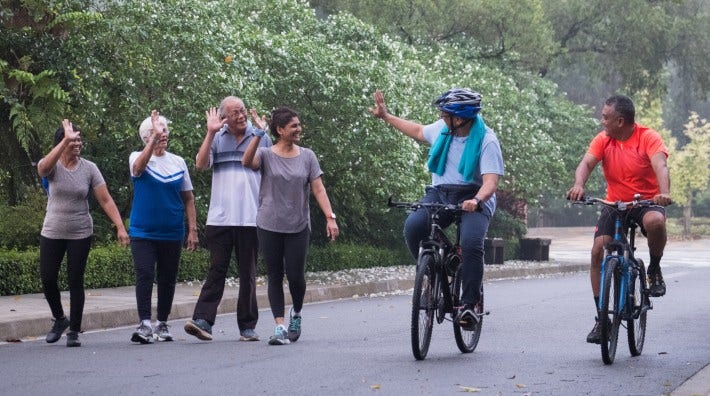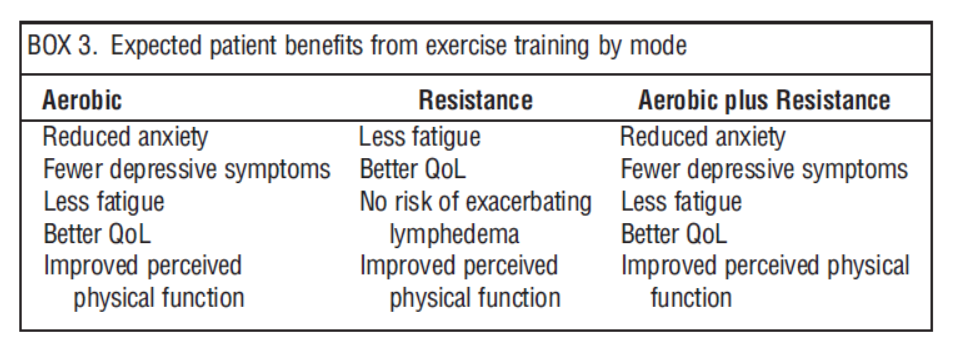Expert Panel: Physical Exercise Helps Prevent Cancer and May Help Cancer Survivors Live Longer

An expert panel on exercise and cancer found such strong evidence that physical activity can help some cancer survivors live longer that they created new exercise guidelines for cancer survivors. They also developed new programs to help ensure that healthcare and fitness professionals can use those guidelines to help make exercise a standard part of cancer treatment. The panel also found evidence that exercise can help prevent some cancers.
The international panel was convened by the American College of Sports Medicine (ACSM) and included experts from the American Cancer Society and National Cancer Institute. Panel members published 3 journal articles to summarize the panel’s conclusions. Alpa Patel, PhD, senior scientific director of epidemiology research at the American Cancer Society was an executive committee member of the roundtable and co-author of all 3 publications.
The report "Exercise Guidelines for Cancer Survivors" said that cancer patients may help ease cancer-related symptoms, including anxiety, depression, fatigue, reduced physical function, and poorer quality of life by doing moderate-intensity aerobic activity or resistance training, or both. Moderate activity is at a pace where you can talk but cannot sing.

In the past, providers often recommended that cancer survivors not do aerobic or resistance training to avoid the start or worsening of lymphedema. The authors said that people with breast cancer may safely help prevent lymphedema or improve its symptoms, by doing a general, progressive resistance training program supervised by a fitness professional that follows the guideline of “start low, progress slow.” In general, the authors said, aerobic exercise seems to be safe as well, with no increase in breast-cancer-related lymphedema, although there is less evidence to support this. The researchers also note that these results may not apply to lymphedema related to other types of cancers.
“These recommendations are designed to help cancer patients incorporate physical activity into their recuperation. They’re an important reminder that all adults should strive to be as physically active as their abilities allow for cancer prevention,” said Patel.
"Translating the Evidence Base into Practice: Exercise Is Medicine in Oncology" includes the recommendation that healthcare workers and fitness professionals use the new exercise guidelines to give “exercise prescriptions” to cancer survivors that will best meet their needs, preferences, and abilities. To help exercise become a standard part of cancer treatment, ACSM introduced:
- Moving Through Cancer, a website for doctors with a searchable registry of appropriately trained professionals and programs in their community.
- Cancer Exercise Trainer certification, developed by the ACSM and the ACS, for fitness professionals to learn how to adapt fitness programs for those just diagnosed with cancer and throughout survivorship.
"The American College of Sports Medicine Roundtable Report on Physical Activity, Sedentary Behavior, and Cancer Prevention and Control" was co-written by ACS’s Patel. As the lead author, she and the other 39 experts on the panel reported evidence to support:
- Physical activity can help prevent at least 7 types of cancer: bladder, breast, colon, endometrial, esophageal, kidney, and stomach. Higher levels of physical activity are linked with lower risks.
- Decreasing the amount of time spent sitting may help lower the risk of colorectal, endometrial, and lung cancers.
- Exercising after being diagnosed with breast, colorectal, or prostate cancer may help reduce the chance of recurrence and improve survival.
- Advising sun safety for people who have or have had cancer when they exercise outdoors, because in addition to people who’ve had melanoma, survivors of some other types of cancer may have an increased risk for developing skin cancer.
“Throughout the world, 1 of 4 adults is physically inactive, increasing their risk of developing cancer or making it worse,” said Patel. “Being physically active is one of the most helpful steps people of all ages and abilities can take to protect themselves from cancer. We need fitness and public health professionals and healthcare providers in every country to spread this message.”




